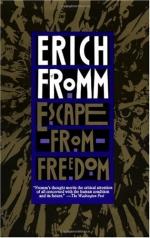
|
| Name: _________________________ | Period: ___________________ |
This test consists of 15 multiple choice questions and 5 short answer questions.
Multiple Choice Questions
1. What political belief aligns with Fromm's definition of freedom?
(a) Anarchy.
(b) Monarchy.
(c) Democracy.
(d) Communism.
2. Who must support the central bureaucracy in order for it to achieve its goal?
(a) All the people in a given society.
(b) Both the lower and upper classes.
(c) The upper class of a given society.
(d) The middle class only.
3. Prior to World War I, who was the lower, middle class obedient to?
(a) German monarchy.
(b) President of the United States.
(c) German chancellor.
(d) They were not obedient to anyone yet.
4. According to Fromm, who must the economy be a servant to?
(a) Man.
(b) Society.
(c) The economy should not serve anyone.
(d) The wealthy politicans.
5. Why does an individual conform to society?
(a) To escape a dictator.
(b) To escape feelings of conformity.
(c) To escape freedoms and individuality.
(d) To escape feelings of isolaton and fear.
6. What approach to history views the economic interests as the cause of religion and political ideas?
(a) Laissez-faire.
(b) Bartering.
(c) Capitalistic.
(d) Economistic.
7. What is the original self?
(a) Self that thinks like the leader.
(b) Self that originates its own mental activities.
(c) Self that does not think.
(d) Self that thinks like society.
8. What assumptions about man are made that lead people to fear chaos if he acts only in accordance with himself?
(a) People assume man is bad and will act destructively.
(b) People assume man will follow others.
(c) People assume man needs more freedom.
(d) People assume man will make the best decisions, all the time.
9. What German social class supported Hitler but did not adopt his ideologies?
(a) Upper class and liberal.
(b) Upper class and conservative.
(c) Middle class and moderate.
(d) Working class and liberal.
10. What happened to Germany's economic stability following World War I?
(a) Germany's economy was weakened.
(b) Germany's economy was strengthened.
(c) Germany's economy was the strongest in its history.
(d) Germany's economy remained unchanged.
11. In addition to a love for Germany, what other authoritarian characteristic did Hitler possess?
(a) Feelings of powerlessness.
(b) Desire to submit.
(c) Hatred for other groups.
(d) Belief in religious freedom.
12. What academic, who Fromm disagrees with, also wrote about the social interpretation of the human development?
(a) Freud.
(b) Engels.
(c) Jung.
(d) Pavlov.
13. What kind of acts are "phenomena of abundance"?
(a) Free or spontaneous acts.
(b) Acts of individuality.
(c) Calculated acts.
(d) Malicious acts.
14. What world event left Germany in financial ruin and ultimately fostered support for Hitler among the lower, middle class Germans?
(a) Germany's civil war.
(b) World War II.
(c) The French Revolution.
(d) World War I.
15. What historian believed that religion drives the social process?
(a) Marx.
(b) Engels.
(c) Weber.
(d) Kafka.
Short Answer Questions
1. Why is it possible for people to conform without their knowledge?
2. Who replaces the original self?
3. What does Fromm believe to be the main driving force in history?
4. What forces in a capitalistic society isolate people?
5. Why did the second group of Germans who both supported the Nazis and adopt their ideas submit to Hitler?
|
This section contains 533 words (approx. 2 pages at 300 words per page) |

|




